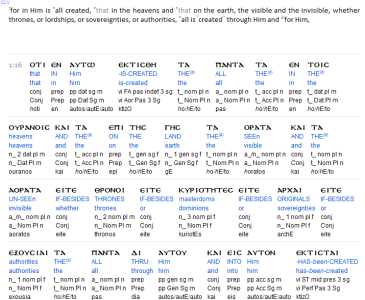Johann
Active Member
Micah 5:2 (Hebrew Text):But he will not address the point
He does not know what he is talking about
He thinks Arche appears in the Hebrew scriptures at Micah 5:2
and if he is quoting from the greek septuagint
Rick Brannan, Ken M. Penner et al., The Lexham English Septuagint (Second Edition.; Bellingham, WA: Lexham Press, 2020), Mic 5:2.
from the beginning , from the days of eternity .” apo archō ek ēmera aiōn
There is simply no way he can escape Christ's pre-existence
and he will divert
וְאַתָּה בֵּית לֶחֶם אֶפְרָתָה צָעִיר לִהְיוֹת בְּאַלְפֵי יְהוּדָה מִמְּךָ לִי יֵצֵא לִהְיוֹת מוֹשֵׁל בְּיִשְׂרָאֵל וּמוֹצָאֹתָיו מִקֶּדֶם מִימֵי עוֹלָם
Word-by-Word Analysis and Morphology
וְאַתָּה (ve-attah)
Morphology: Conjunction וְ ("and") + אַתָּה (2nd person masculine singular pronoun, “you”)
Meaning: The verse begins with an address, “And you,” directed toward Bethlehem. This introduces Bethlehem Ephrathah as the subject.
בֵּית לֶחֶם (Bet Lechem)
Morphology: Proper noun (singular, feminine)
Meaning: “Bethlehem,” meaning "house of bread," identifies the town. Bethlehem is in the region of אֶפְרָתָה (Ephrathah), further specifying the locality in Judah.
אֶפְרָתָה (Ephrathah)
Morphology: Proper noun (feminine singular), a place-name
Meaning: Ephrathah, often associated with Bethlehem in Judah, emphasizes the town's humble status, which is further supported by the next phrase.
צָעִיר (tsa'ir)
Morphology: Adjective, masculine singular
Meaning: “Small” or “insignificant.” This term modifies Bethlehem, highlighting its lowly or humble stature among the "clans" of Judah, a theme common in prophecies where greatness emerges from unexpected places.
לִהְיוֹת (liheyot)
Morphology: Preposition לְ ("for") + infinitive construct of הָיָה (to be)
Meaning: “To be” or “for being.” This infinitive construct shows purpose, often used to describe a destined role or action. Bethlehem, though small, is designated for a significant role.
בְּאַלְפֵי יְהוּדָה (be-alfei Yehudah)
Morphology: Preposition בְּ ("among" or "in") + noun אַלְפֵי (plural construct of אֶלֶף, meaning "clans" or "thousands") + יְהוּדָה (proper noun, “Judah”)
Meaning: “Among the clans of Judah.” This phrase reinforces Bethlehem’s modest standing within Judah’s tribal structure.
מִמְּךָ (mimeka)
Morphology: Preposition מִן ("from") + 2nd person masculine singular suffix (“you”)
Meaning: “From you.” This emphasizes that from Bethlehem specifically, a ruler will arise, linking the prophecy to a specific lineage or origin.
לִי (li)
Morphology: Preposition לְ ("for") + 1st person singular suffix ("me")
Meaning: “For me,” expressing the ruler’s purpose to serve God directly. This pronoun implies divine commissioning, where the coming ruler is selected by God for His purpose.
יֵצֵא (yetze)
Morphology: Verb, Qal imperfect, 3rd person masculine singular of יָצָא (to go out, come forth)
Meaning: “Will come forth.” The imperfect aspect indicates a future action or a continuous quality. The ruler’s emergence is anticipated, suggesting that Bethlehem will produce this figure by divine orchestration.
לִהְיוֹת מוֹשֵׁל (liheyot moshel)
Morphology: Infinitive construct of הָיָה (to be) + participle מוֹשֵׁל (masculine singular of מָשַׁל, "to rule")
Meaning: “To be a ruler.” This describes the purpose of the coming one, signifying a leadership role with connotations of authority and governance over Israel.
בְּיִשְׂרָאֵל (be-Yisra’el)
Morphology: Preposition בְּ ("in" or "over") + proper noun יִשְׂרָאֵל ("Israel")
Meaning: “Over Israel.” This phrase completes the designation of rulership, indicating that the promised leader will have authority over Israel specifically.
וּמוֹצָאֹתָיו (u-motza’otav)
Morphology: Conjunction וּ ("and") + noun מוֹצָאֹת (plural construct form of מוֹצָא, “going forth” or “origins”) + 3rd person masculine singular suffix (“his”)
Meaning: “And his origins” or “and his goings forth.” This term can indicate an emergence or origin. In the plural form, it implies either multiple actions (his “goings forth”) or a sense of origin that is timeless, lending itself to an interpretation of continuous existence or ancient origin.
מִקֶּדֶם (miqqedem)
Morphology: Preposition מִן ("from") + noun קֶדֶם (“old” or “ancient”)
Meaning: “From of old” or “from ancient times.” This phrase suggests either ancient ancestry (linking to the Davidic line) or a concept of timeless existence.
מִימֵי עוֹלָם (mimei olam)
Morphology: Preposition מִן ("from") + noun יָמִים (construct plural of “days”) + noun עוֹלָם (“eternity” or “ancient times”)
Meaning: “From the days of eternity” or “from ancient days.” The term olam often implies timelessness, adding depth to the ruler's origins by extending them to ancient or even eternal times.
The syntax of Micah 5:2 places significant emphasis on the humble origins of the coming ruler, Bethlehem, while also attributing to this figure an origin that is rooted in ancient or timeless terms. Here’s how the verse can be understood:
Bethlehem Ephrathah, despite being small among the clans of Judah, will produce a ruler specifically for God’s purpose.
This ruler’s “goings forth” or “origins” are described as being “from of old” and “from ancient days,” terms that imply either a deep historical lineage (as in David’s line) or a hint of timeless preexistence.
The verse’s morphology and syntax allow for the interpretation that this ruler not only fulfills the lineage of David but also possesses an existence that spans beyond mere human history. The phraseology, particularly with miqqedem and mimei olam, holds a dual layer of meaning: it alludes both to a historical root (David’s line) and suggests a mysterious or even eternal nature, which later Christian readings connect to Jesus’ divine preexistence.
J.

